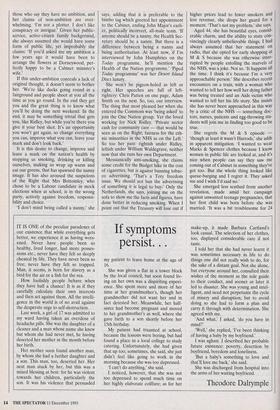If symptoms
persist. . .
IT IS ONE of the peculiar paradoxes of our existence that while everything gets better, we experience it as having wors- ened. Never have people been so healthy, lived longer, had more posses- sions etc.; never have they felt so deeply cheated by life. They have never been so free; never have they felt so trapped. Man, it seems, is born for slavery as a bird for the air or a fish for the sea.
How foolishly people behave when they have half a chance! It is as if they carefully calculate their own interests and then act against them. All the intelli- gence in the world is of no avail against the desperate urge to self-destruction.
Last week, a girl of 17 was admitted to my ward having taken an overdose of headache pills. She was the daughter of a cleaner and a man whose name she knew but whom she had never met, he having deserted her mother in the month before her birth.
Her mother soon found another man, by whom she had a further daughter and a son. This man, too, deserted her. Her next man stuck by her, but this was a mixed blessing at best: for he was violent towards her children, particularly the son. It was his violence that persuaded my patient to leave home at the age of 16.
She was given a flat in a tower block by the local council, but soon found liv- ing on her own was a dispiriting experi- ence. She spent more and more of her time at her grandmother's, though her grandmother did not want her and in fact detested her. Meanwhile, her half- sister had become pregnant and moved to her grandmother's as well, where she gave birth to a son shortly before her 15th birthday.
My patient had truanted at school, because the lessons were boring, but had found a place in a local college to study catering. Unfortunately, she had given that up too; sometimes, she said, she just didn't feel like going to work in the morning because she was too depressed.
`I can't do anything,' she said.
I noticed, however, that she was not too depressed to spend much time on her highly elaborate coiffure; as for her make-up, it made Barbara Cartland's look casual. The selection of her clothes, too, displayed considerable care if not taste.
I told her that she had never learnt it was sometimes necessary in life to do things one did not really wish to do, for the sake of a distant goal. Not she alone, but everyone around her, consulted their wishes of the moment as the sole guide to their conduct, and sooner or later it led to disaster. She was young and intel- ligent, and need not perpetuate the cycle of misery and disruption; but to avoid doing so she had to form a plan and carry it through with determination. She agreed with me.
`And what,' I asked, 'do you have in mind?'
`Well,' she replied, 'I've been thinking of having a baby by my boyfriend.'
I was aghast. I described her probable future existence: poverty, desertion by boyfriend, boredom and loneliness.
`But a baby's something to love and that'll love me back,' she said.
She was discharged from hospital into the arms of her waiting boyfriend.
Theodore Dalrymple


































































 Previous page
Previous page